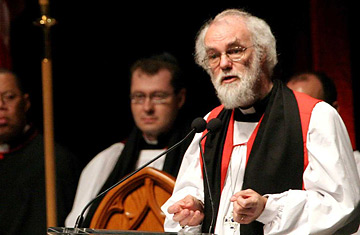
The Most Reverend Rowan Williams, Archbishop of Canterbury, speaks to a gathering of American Bishops in New Orleans, September 20, 2007.
An uneasy peace has brooded over the 2.3-million-member Episcopal Church of the U.S.A. and its global parent body, the 77-million-member Anglican Communion, for some four years now. And a key voice vote Tuesday evening at the American bishops' conference in New Orleans has set up a decisive showdown that could well end the unity of the Communion.
At the end of their five-day meeting in New Orleans, the Episcopal House of Bishops made their response to three demands presented by the Communion's leaders last February: that the generally liberal U.S. church accept the Communion input in creating conservative bishops to pastor some of its more disaffected members; that it cease to make any more gay bishops, as it did in 2003 with the Right Rev. V. Gene Robinson of New Hampshire; and that it stop blessing same-sex union ceremonies.
The Americans certainly seemed to want to come up with a formulation that would enable them to continue on their own track while still remaining part of the Communion. The global Anglican body disapproves of the American stance on homosexuality but, nevertheless, takes about a third of its funds from its U.S. affiliate. In the first few days of their parley they met with Rowan Williams, the Archbishop of Canterbury and the Communion's embattled titular head, who has become somewhat adept at the art of forestalling a schismatic confrontation. Consistent with this goal, Williams, who didn't stay for the final vote, clearly tried to take the pressure off the conference by saying that there was "no ultimatum involved" in the Communion's demand.
But this may not represent the thinking of the majority of Anglicans or, certainly, conservative firebrands like Archbishop Peter Akinola of Nigeria. And in New Orleans, the Episcopal Bishops, in a near-unanimous voice vote, essentially confirmed what they had said less formally on other occasions: They rejected the notion of Communion involvement in the bishops they choose, promised to "exercise restraint by not consenting" to non-celibate gay bishops and pledged not to approve prayers to bless gay couples.
All of this falls short of what the global Anglican leadership asked for. Indeed, at the end of August, the Chicago Episcopal diocese named an openly gay woman as one of five nominees for a bishop's position. And a pledge not to come up with a specific prayer for gay marriages doesn't necessarily mean that individual priests won't continue to perform improvised ceremonies.
The American bishops threw verbal sweeteners into the resolution, stressing their "passionate desire" to remain in the Communion. Episcopal Presiding Bishop Katharine Jefferts Schori called the results "sacrificial," which might even be accurate, given the pro-gay-rights attitude of what is probably a significant majority of her flock.
But it may not be enough. The Rev. Kendall Harmon, a conservative strategist, was quoted in the Religion News Service as calling the results of the conference "insulting." Martyn Minns, a former Episcopal rector who jumped ship to take a position in a competitor Virginia-based Anglican "convocation" under Nigeria's Akinola, gave TIME what is probably a milder preview of his boss's likely response: "I think this is far short of what was asked for. It's a technical slide-by at best." The Associated Press quoted the Right Rev. John Howe, the conservative Episcopal bishop of Central Florida, as saying the statement wouldn't satisfy all Anglican leaders, but that "most will find it acceptable." But that may be wishful thinking on Howe's part, who despite his differences with church leadership says he will not abandon the American organization.
The Communion is scheduled to review the Episcopal vote over the next few weeks. It is always possible that Williams will be able to forestall drastic action against the American church at least until all the Anglican Bishops gather at their once-a-decade Lambeth conference next July. However, both the liberal Episcopalians and the Communion conservatives seem so fixed in their positions that it is hard to imagine that the current delicate balance can be sustained too much longer.
